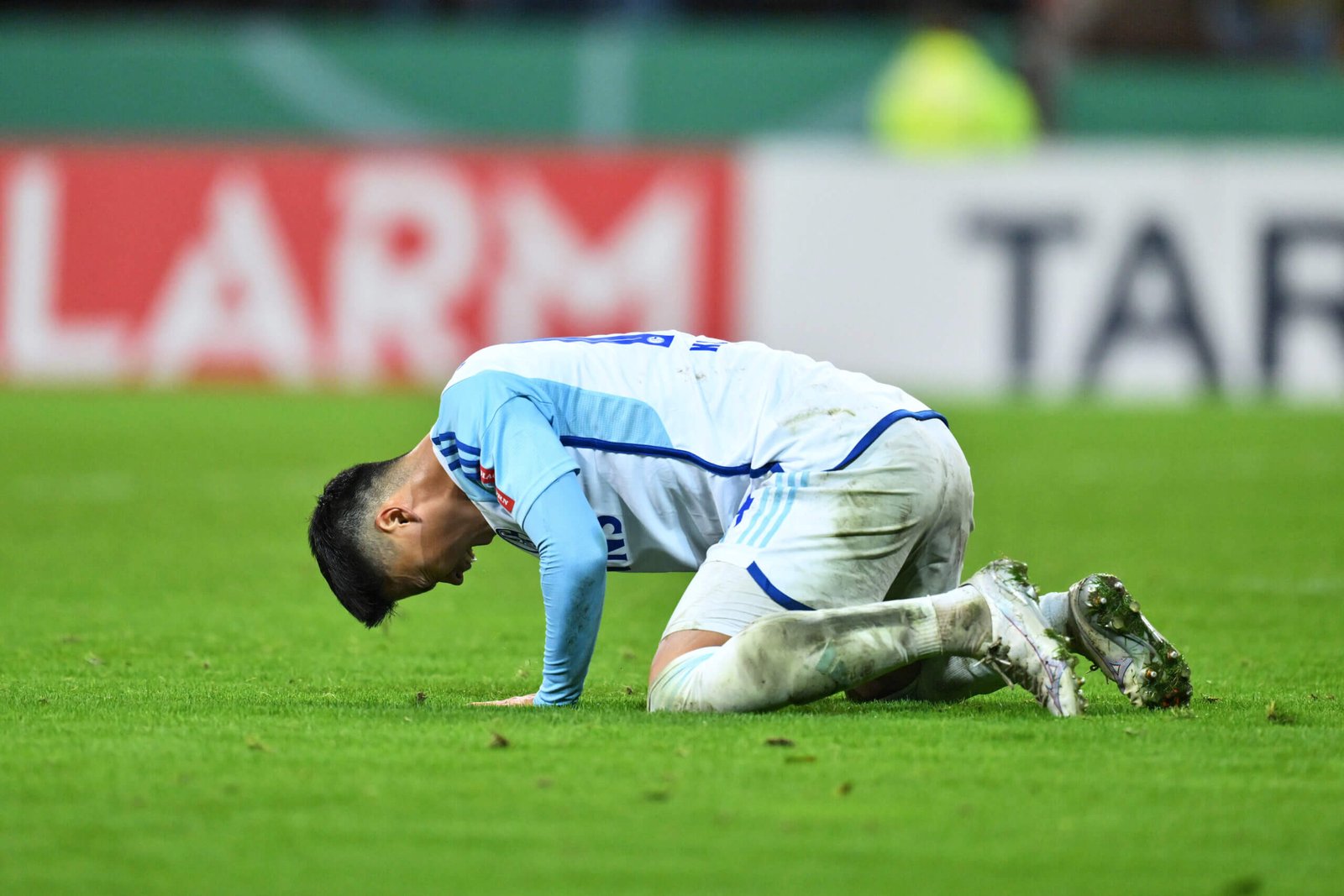These are tough times in Gelsenkirchen.
Schalke, the beloved local football club and former giants of the German game, are 14th in Bundesliga 2, much closer to relegation to the third division than re-promotion to the top flight. Former chairman of the supervisory board Clemens Toennies is openly calling for a change of leadership, stoking a civil war behind the scenes. To add insult to injury, Schalke’s hometown has now even become the butt of jokes on U.S. late-night television.
Taylor Swift is “doing three nights in a 63,000-people soccer stadium there, even though no one’s ever heard of Gelsenkirchen, Germany”, Jimmy Kimmel said in his intro last week. “It might not even exist.”
Unbeknown to the ABC host, there used to be a satirical conspiracy in Germany that the city of Bielefeld (population 360,000) wasn’t real. Football supporters of Schalke and other sides from the Ruhr area, the hotbed of German football, particularly enjoyed that silly meme because it chimed with the sporting irrelevance of Arminia Bielefeld, situated a good hour up the road in East Westphalia.
🤔🤔
📽️ @JimmyKimmelLive pic.twitter.com/oz1RvuvrbT
— FC Schalke 04 (@s04_en) February 3, 2024
To hear Gelsenkirchen’s actuality questioned the very week Toennies warned that the club were facing “sporting and financial ruin” might elicit more pity than schadenfreude among opposition fans, however. It’s no laughing matter when one of the biggest institutions in German football teeters on the precipice.
Schalke’s fall from grace within five years of playing in the last 16 in the Champions League bears some familiar traits. Like Hamburg and Hertha Berlin before them, Schalke have suffered from a series of poor decisions at boardroom level and were made to pay a heavy price when the Covid-19 crisis exposed their unsound financial foundations.
Schalke made the Champions League semi-finals in 2011 (Michael Regan/Getty Images)
Turnover has decreased from €350million (£298m; $377m) in 2018-19 to about half in the current season. Radical cuts in the team budget saw them eke out a tiny profit last season, but that austere course hasn’t made much a of dent on €180m of debt.
Toennies, who was ousted in 2020 in the aftermath of racist comments and a mass outbreak of Covid among employees at one of his meat-processing factories, has his own reasons for decrying the club’s impending meltdown, but the implications of a slump to 3.Liga would indeed be catastrophic. TV rights income alone would shrink from roughly €25m in this campaign to €1.3m per season — not nearly enough to live on for a club of Schalke’s size.
Saturday’s 1-0 win over Eintracht Braunschweig kept Schalke just outside the relegation places, but doubts over their fundamental competitiveness persist. Belgian coach Karel Geraerts, the successor to Thomas Reis, has won as many games (five) as he’s lost since taking over in October, a record that spells stagnation, not improvement.
Appointing his compatriot Marc Wilmots as sporting director in January was a real crowd-pleaser in Gelsenkirchen, but the former Schalke midfielder lovingly known as “Willi das Kampfschwein” (Willi the battle hog) has no experience in the role and only failed stints at Club Olympic Casablanca and the national teams of Iran, Ivory Coast and Belgium under his post-playing-career belt. Now that Schalke can’t afford to shop in the middle shelf let alone the top one, they would have done better bringing in a real transfer-market specialist instead.

(Oliver Hardt/Getty Images)
More pain is to come off the pitch. Chairman of the board, Matthias Tillman, announced “tough decisions” this week, hinting at a loss of jobs at the club’s HQ. There’s also been rumoured talk of Schalke selling off its catering and marketing rights to generate additional income.
Their failure to secure lucrative shirt sponsorship illustrates how much the Schalke brand has been damaged by the recent lack of success. Brewing company Veltins, who own the naming rights to the stadium, helped out with a one-year deal for around the €2m mark after negotiations with another firm for more than double the sum fell through just before the start of the new season.
Schalke, wholly run by its members without any strategic minority investors, is a noisy, highly politicised club at the best of times, as leading figures and those vying for power need the backing of supporters.
Fears for the future of the club have predictably strengthened the hand of the “opposition”, a group reportedly made up of businessmen, sponsors and friends of Toennies. The 67-year-old denied there being an organised attempt to take over the club in an interview with WAZ on Tuesday, but he also called for the existing regime to be replaced by “experts from the realms of commerce and sports” and offered to find suitable candidates within his network.

(Stuart Franklin/Getty Images)
“Things can’t go on as before,” Toennies said. “The catastrophic development of the last three years brings tears to every Schalke supporter.”
They do indeed. Even Schalke’s ultras are running out of patience with their underperforming team. During the 5-3 defeat at Fortuna Dusseldorf in November, many left at half-time. Similar scenes were seen at the 3-0 loss in Karlsruhe a month before.
To make wholesale changes to the boardroom, Schalke first need a newly elected supervisory board. The struggle for control of the Royal Blues will therefore be long and messy, whatever division Schalke find themselves in next season.
Bielefeld’s back-to-back relegations straight down to 3.Liga since 2022 shows that things can quickly get a lot worse. While the good people of Gelsenkirchen should take heart from Swift’s three concerts putting their town on the map in July, it might well be a few good years before Veltins-Arena will see any first-class entertainment again.
(Top photo: Leon Kuegeler/Getty Images)
Read the full article here


